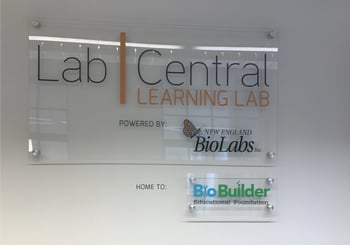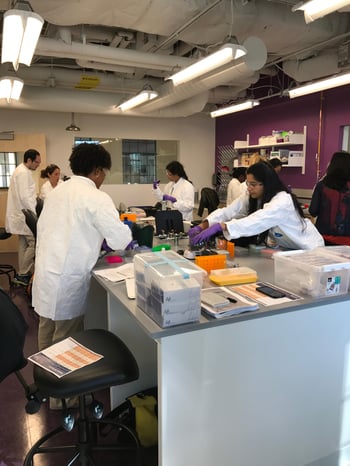 As a tech at Addgene, part of my job, in addition to preparing DNA and generating/replenishing kits, is to find new ways to make lab processes more efficient. Being in the Boston area, we get many opportunities to learn from other biotech companies at workshops and can use what we learn to improve processes in the Addgene lab. In this post, I’ll tell you a little bit about what I learned from a New England Biolabs (NEB) hosted workshop at Lab Central and discuss why these types of workshops could be useful to anyone working in a lab.
As a tech at Addgene, part of my job, in addition to preparing DNA and generating/replenishing kits, is to find new ways to make lab processes more efficient. Being in the Boston area, we get many opportunities to learn from other biotech companies at workshops and can use what we learn to improve processes in the Addgene lab. In this post, I’ll tell you a little bit about what I learned from a New England Biolabs (NEB) hosted workshop at Lab Central and discuss why these types of workshops could be useful to anyone working in a lab.
Participating in a workshop at lab central
We’re working on a project where we aim to do large scale DNA preps with multiple samples without cross contamination. We currently use the CosMCPrep system for this, but thought we could learn a little bit more about high throughput DNA prepping by trying out NEB’s new NEBNext Ultra II FS DNA Library Prep Kit for Illumina sequencing and took a class at NEB’s new teaching space at Lab Central to learn all about it.
LabCentral is a lab and office space shared by numerous emerging biotech companies. The space was modern with clean bold colors of orange and white. The decor was very contemporary and futuristic with block chairs in the hallway for people to take a break and relax. Companies at LabCentral get access to a variety of experimental services and expertise without breaking their bank accounts. When I heard about how LabCentral aims to enable emerging biotech companies, I was excited to go there because both LabCentral and Addgene aim to make scientific advancement easier.
NEBNext Ultra FS DNA Library Prep Kit
T o create a DNA library, one must first fragment a DNA sample into many small components. Without proper processing, these small DNA strands can form concatemers in later steps. This new NEB kit includes a step that both fragments the DNA and prevents it from forming concatemers later. The "FS" stands for Fragmentation System and this is the most important part of this newly released prep kit. In their prior NEBNext Ultra II DNA Library Prep Kit for Illumina, one was only able to extract libraries from previously fragmented DNA.The general process for library preparation using this kit is:
o create a DNA library, one must first fragment a DNA sample into many small components. Without proper processing, these small DNA strands can form concatemers in later steps. This new NEB kit includes a step that both fragments the DNA and prevents it from forming concatemers later. The "FS" stands for Fragmentation System and this is the most important part of this newly released prep kit. In their prior NEBNext Ultra II DNA Library Prep Kit for Illumina, one was only able to extract libraries from previously fragmented DNA.The general process for library preparation using this kit is:
- Fragmentation and end repair
- Adapter Ligation
- Clean up/Size selection
- Amplification
- Clean up
I found this kit easy to use because it required only about 15 minutes of my hands on time and a total of about 3 hours. It was robust, capable of generating a wide range of insert sizes and also produced high yields of quality libraries from small amounts of DNA i.e 100 pg.
At the start of the workshop, NEB gave a brief presentation describing the technology. Then we split into pairs to actually try out the kit itself. This was great because it forced workshop participants from different biotech companies to interact and learn more about one another. They also provided both breakfast, lunch, and snacks. At the end of the workshop, all our newly created libraries were analysed to see how well the kit worked. As NEB hoped, we found that regardless of how much DNA we started the process with, we got great amplification of our sample libraries. NEB also gave us a few goodies which included an NEB drawstring backpack and a double wall insulated glass to take home with us.
Tips to to get the most out of a workshop
Although we probably won’t use the NEB kit in the exact way we did at the workshop (the kit is mostly used to make new libraries as opposed to replicating them like we do at Addgene), going to the workshop was a great opportunity because I got to expand my skills and network with other technicians/company representatives. I got to talk with a technician from Neon Therapeutics, a biotechnology company that uses neoantigen biology to treat cancer. My partner for the day was Julie from Novartis who was working with cell culture and who was extremely helpful since she was familiar with library generation.
Also, I now know what to expect at a workshop and what kinds of questions to ask myself when I am bombarded with a lot of information. For example, before going to my next workshop, I’ll ask myself:
- What are the familiar parts of this workshop?
- What do I understand already?
- What don’t I understand?
- How does the information I’ll be learning relate to me as an individual and Addgene as a company?
- What’s the key thing I’m hoping to learn from this workshop?
These questions will help me avoid being overwhelmed by all the new information, and instead allow me to pay attention and answer my key questions.
As an added bonus, I also got the opportunity to present what I learned to my coworkers back at Addgene and got to summarize my experience in my first blog post! I highly recommend doing the same if you ever go to a workshop because it will help you think about the most useful pieces of information from the workshop.
Future workshops for Addgene
Addgene strives to be a great resource for the research community, so it is extremely important for us as a company to constantly update our processes and get new ideas from learning experiences like workshops at Lab Central. Because of the fast pace of work in the Addgene lab, we don’t often get the opportunity to explore new techniques in our own space. Workshops such as this give us a chance to learn something new without spending a lot of time developing and making space for the techniques ourselves. As you probably have limited time and space in your own lab, you should give similar workshops a try if you’re ever looking to try out a new technique or reagent!

Racheal Komuhendo is a Lab Technician at Addgene who is interested in medicine and music.
Additional Resources on the Addgene Blog
- Automation at at Addgene
- Developing Lab Management Software for Biology
- Learn about CRISPR Pooled Libraries
Resources at Addgene.org
- Find pooled libraries at Addgene
- Find basic lab protocols at Addgene
Topics: Addgene News





Leave a Comment